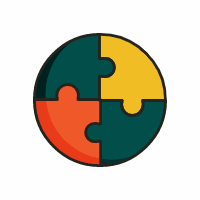Our Systems Approach
Health and public health are complex systems.
Health and public health are complex systems with many interconnected parts and relationships, including one's biology and genetics, culture, social networks, environment, and economics. Communities, cities and countries are increasingly interconnected via businesses, transportation, media and the internet. Any factor, change, policy or intervention within one portion of society can have reverberations within a community, city, state, region, country, or even world-wide.
The dangers of not using a systems approach
Making a decision that involves such complex systems is challenging since seeing the secondary, tertiary, and other indirect effects of a change can be difficult. If you don’t fully understand the systems that affect and are affected by health, it can be hard to establish policies, interventions, products, and guidance that work for different people and circumstances. In fact, not using a systems approach can even result in unintended consequences, worsening existing disparities, Band-Aids rather than solutions, expended time, effort and other resources from trial and error, missing second and tertiary effects, and introducing bias.
Systems approaches have transformed other fields
Meteorology, transportation, and air traffic control are just a few fields that were transformed with the advent of systems approaches like computer modeling. Before computer models generated the weather predictions that we have available today, it was difficult to see how wind, barometric pressure, cloud formations, temperatures, and precipitation all fit together to form weather patterns. Now we have the Doppler radar and weather predictions at our fingertips due to systems approaches like computer modeling. These transformations didn’t result from siloed approaches but instead resulted from efforts to incorporate all the complex factors that make up the entire system.
PHICOR’s Systems Approach
Our PHICOR (Public Health Informatics, Computational, and Operations Research) team is based at the City University of New York Graduate School of Public Health & Health Policy (CUNY SPH). For over two decades, PHICOR has been developing systems, artificial intelligence (AI), and other computational approaches, methods, models, and tools to help decision makers better understand and address complex systems in health.
This approach allows PHICOR to:
Break down complex systems into simplistic forms
Save time, money, and other resources that are associated with traditional problem-solving methods
Strip away the noise and make complex systems easier to understand and tackle
Computer simulation modeling and AI
PHICOR’s computer simulation models and AI serve as virtual laboratories to better understand and explore the impact of a policy, product, or intervention all within the safety of a computer before making any decisions. They allow for virtual testing of different circumstances, interventions, and policies that may not be possible or practical or ethical in real-life.








